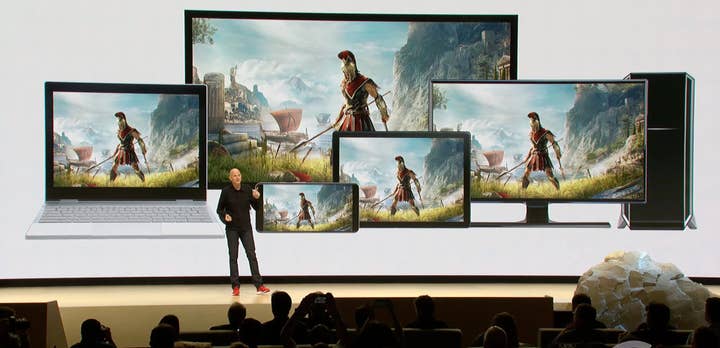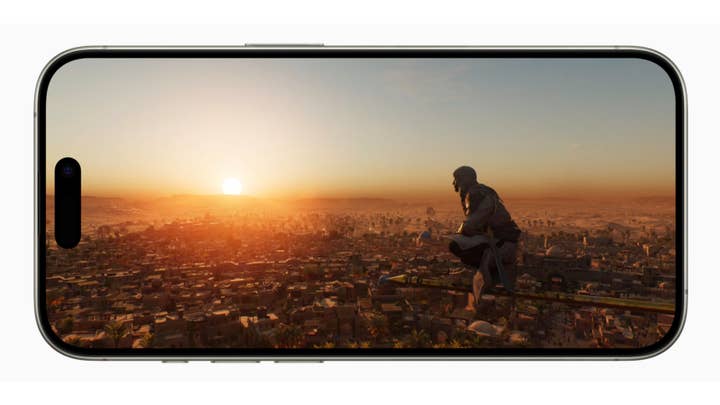AAA games on iPhone 15 Pro: Game changers or gimmick? | Opinion
Bringing blockbusters to mobile is a potentially exciting prospect, but there are still a lot of questions to be answered
Sign up for the GI Daily here to get the biggest news straight to your inbox
Weirdly enough, I was playing Fable 2 on Tuesday night, using my phone and Xbox Cloud Gaming.
I've barely used the service since it went into beta – in fact, I don't regularly play any games on my phone – but I thought I'd give it a go and see how well it ran.
Overall, it was… okay. My character's actions and movements were slightly delayed from when I instigated them, but even if they had been synchronised, there was part of me that wondered if this sort of title would ever be suited to a mobile device.
So I was more than a little amused to wake yesterday morning and find that Apple has only gone and announced that Assassin's Creed Mirage, Death Stranding, Resident Evil Village and other AAA games are coming to iPhone 15 Pro.
This is not the first time Apple has tried to bring console-like experiences to iOS (anyone remember Infinity Blade?). Mobile users can already play Minecraft, Call of Duty Mobile, PUBG Mobile, Genshin Impact and a whole range of other experiences that would not look out of place on a traditional games platform – plus there are more on the way, such as Ubisoft's Assassin's Creed spin-off Codename Jade.
Most, if not all, of these are multiplayer-centric games that offer cross-play with their console versions. Seeing blockbuster single-player games of this scale on mobile is unheard of, yet Assassin's Creed Mirage will reportedly be the full console experience ported to a device we carry around with us every day. It's impossible not to hear that and not raise your hopes, plus at least one eyebrow.
The biggest video games just aren't suited to the smaller screen
Mobile has been the biggest sector of the games market for years now. Games companies know that's where the biggest audience is and therefore the biggest potential for growth – hence Microsoft attempting to buy King owner Activision Blizzard, Take-Two snapping up Zynga, EA purchasing Glu, and so on.
And just as all other forms of entertainment have made their way to smartphones – books, audiobooks, movies, TV, music, comics, etc – some may argue that it's inevitable that video games of all scopes will eventually be available on mobile. Bringing console games to this format opens up new revenue sources for publishers and potentially new customers.
The fact that smartphones are compatible with traditional game controllers (the iPhone 15 Pro will link up with the PS5 DualSense) or even gamepad-like accessories such as the much-lauded Backbone controller means the age-old problem of interface has been minimised. While touchscreen controls have never quite fit with larger games, the option to use buttons and sticks – including on a controller you may already own – removes a major hurdle, even if it is a little ungainly playing with a phone clip compared to a proper handheld system.
So finally we have smartphones that are powerful enough to play a fully fledged console game, with the correct controls, and it will run natively without lag. This feels like the beginning of a major step-change for mobile gaming, and the games industry in general – and yet I have questions and doubts that linger.
First, there's the question of price. Few publishers have succeeded in selling premium games on mobile for more than £10, often more than £5 (I've always been intrigued as to how well Square Enix's £15-£20 ports of old Final Fantasy games fare). I recall speaking to an indie studio that hoped to sell its text adventure about travel for $20, but the price was dropped to $9.99 by launch.
Also, the criticism against Google for charging £50 for Red Dead Redemption 2 on Stadia is still fresh in many people's minds. Selling Assassin's Creed at full price on mobile would be inadvisable, but it's hard to imagine publishers lowering that tag significantly given the budgets behind AAA games – especially for new releases, although perhaps older titles like Death Stranding will have a reduced price point.

The bottom line is, as has been the case for years now, the mobile audience is one that has become accustomed to free and cheap games. That behaviour feels irreversible at this point, and the prospect of full-price blockbusters is unlikely to change that.
There's potential for crossover with the rise of subscription services here. Perhaps, as with Netflix-published games, I can download a 'free' version of Assassin's Creed Mirage if I'm subscribed to Ubisoft+. But with subscriptions still not a dominant channel in the way they are for music and TV/film, individual purchases are still more likely to be how people acquire these games.
Then there's the question of size. Death Stranding takes up around 80GB on a console's hard drive, Resident Evil takes 68GB and Assassin's Creed Syndicate (the last smaller-scale title in the series) takes 40GB. Games already have to compete for space on a 1TB console, but on a smartphone where they're also up against gigabytes of photos, videos, music, podcasts, movies and so on? Even with some clever compression techniques or lower-resolution assets, full-scale AAA console games are going to take up a massive chunk of your phone – how many people are going to give them the space?
Games compete for space on a 1TB console, but on a phone where they're also up against gigabytes of photos, videos, music, podcasts, movies and so on?
And, on a similar note, does that mean we're likely to see a limit to the sort of AAA games brought to mobile? Ubisoft no doubt chose Mirage for iPhone as it's the next major Assassin's Creed, but could Valhalla have worked? Could Odyssey or Origins? Could something like Starfield run on an iPhone 15 Pro? And if it did, would there be room for anything else?
Even if size isn't an issue, power consumption likely is. AAA games require significantly more juice than your average mobile title; it's all well and good enabling smartphone users to play titles designed to be enjoyed for hours at a time, but if the battery is drained in minutes, the phone overheats, or you need to be tethered to a charging cable, the experience becomes impractical.
While the availability of controllers enables these games to be played on iPhone, how many people actually invest in such devices? I personally haven't, and I don't know many of my fellow gaming friends who have. And while I could work out how to pair my DualSense with an iPhone, I'm more likely to keep it paired with my PS5 and play Assassin's Creed Mirage on the big screen.
Which leads to the big question: just because these games are available for iPhone, how many people are going to play them in this way?
It's part of the reason I was sceptical about Stadia, why I've been sceptical about Xbox Cloud Gaming taking off on mobile, and why I haven't really used either on my smartphone; the biggest video games just aren't suited to the smaller screen.
AAA games are generally built around dedicated play sessions, the hour or two you carve out of an evening/weekend to fully immerse yourself in whatever title you're working through. The majority of mobile games are still built with the drop-in, drop-out mentality; sure, developers hope you'll play (and spend) for hours on end, but they know that you could turn your phone off at any moment and want to pick up right where you left off – something that's much harder to do with console blockbusters.
Mobile gaming also fits around your entire life. You don't just play at home, you play on the train, on the bus, waiting on the platform, walking from destination to destination while occasionally glimpsing up to make sure you don't bash into lampposts and/or people. It's often a one-handed half-minded experience, as opposed to a two-hands-on-the-controller, full-attention-required sort of experience.
And that's without taking into account the accessibility issue; I already have to squint at a 50-inch TV to read the text in some games, so I don't particularly want to push my phone up against my face to understand an inventory screen.
Then there's the smartphone's role as a second screen. How many players keep their phone to hand to quickly look up tips or guides for Zelda or Starfield while they're playing on their TV? Multitasking this on a controller-clad iPhone, particularly if you have to remove the accessory before you search and reattach it afterwards, adds considerable friction to your gameplay session.
Will there be use cases for AAA gaming on mobile? Of course there will – hence the success of the Switch and the Steam Deck, and Sony's hopes for the PlayStation Portal. But will it be a significant enough audience to warrant publishers releasing all their biggest games on mobile? At this stage, I'm not entirely convinced.
This feels like the beginning of a major step-change for mobile gaming, and the games industry in general – and yet I have questions and doubts that linger
And perhaps an even bigger question: what next? For AAA games to take off on mobile, they need to be available on more than just the latest £1,000-plus iPhone. As components become more affordable, future generations of iPhone should be able to support these games with their base model, but that will take time.
Will Google follow suit and enable these large-scale titles on its latest smartphones? Will Samsung and Huawei and all the other phone manufacturers? Apple focused on the iPhone 15 Pro, but will the iPad and other tablets be able to play these games, essentially becoming akin to the Steam Deck?
At the risk of getting too far ahead and veering dangerously close to the 'death of consoles' prediction, if AAA games on mobile do take off, what does it mean for traditional platforms? If the biggest blockbusters are coming to that device you already carry around in your pocket, and playing it in this manner fits in with your life – and you have an Apple TV so can mirror content to the big screen – perhaps you won't need a £500 box in your living room.
Granted, that's getting a tad ridiculous, but if that future is possible, the starting point could well have been last night's announcement.
For now, I'm going to ponder these and many other questions further, see which other publishers bring their blockbusters to mobile in the next few years… and maybe start shopping around for a Backbone controller.
Sign up for the GI Daily here to get the biggest news straight to your inbox

